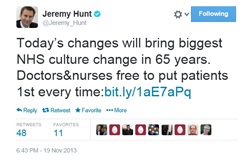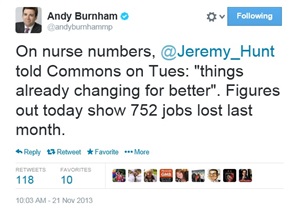Many of us will remember the scandal at Stafford Hospital in the late 2000s. A report by Robert Francis QC exposed a sub-culture within parts of the NHS that repeatedly and severely compromised patient safety, experience and quality of care. At the most extreme, it led to patients dying needlessly due to dehydration and exposure to severe neglect.
 |
 |
The Francis Report
Today marks one year since the publication of the final report of the Mid Staffordshire NHS Foundation Trust Public Inquiry, now known as the Francis report. We always want to hear more on what the impact of the report has been, especially from the online community of cancer patients themselves.
Although the extreme failings and appalling suffering that Francis highlighted weren’t limited to Mid Staffs, we don’t believe they are routine across the NHS. Evidence suggests that every day, cancer patients are supported by great people providing treatment, support and care. But as Macmillan’s Chief Executive, Ciarán Devane said today in a letter to the Editor of the Telegraph, “While the majority of NHS staff deliver fantastic care, some patients are still being let down when they are at their most vulnerable.”
Of course we’re not expecting that the experience of sometimes-unavoidably long days in hospital or gruelling treatment regimes will always be positive. But we do believe that every cancer patient should be treated with kindness, compassion, dignity and respect during their care in hospital.
What has changed?
The recommendations from the Francis report promote a fundamental culture change to put patients at the heart of the NHS. The whole health system – just like individual health professionals – has a responsibility to ensure that happens. The Government adopted nearly all of the recommendations of the Francis report in November last year, with a focus on openness, transparency, candour and compassion. It has been contentious though. In response to Jeremy Hunt’s statement on the Inquiry, Andy Burnham, Shadow Secretary of State for Health questioned why 86 Francis Report recommendations were not being implemented and asked why Mr Hunt had stopped short of imposing minimum safe staffing levels.
We would hope that the Francis report served as a wake-up call to the NHS a year ago and cultures are beginning to change. Do you think this is the case? We hope you’ve never experienced anything less than positive care, but have you seen things improve at all in the last year? We’d love to hear from you.
What does the NHS need to do?
We think the publication of the Francis Report really was a watershed moment for the NHS, and to mark a year since its passing we’ve published a report: Macmillan’s vision for building and strengthening a common culture of care. Francis Inquiry report: one year on.
We are campaigning to make sure cancer patients are always treated decently, and for this to happen the NHS needs to do three things:
You can read the report, and we’d love to hear what you think about all of this: what has your healthcare been like for you since the scandal at Mid Staffs unfolded? Let us know in the comments below.
Whatever cancer throws your way, we’re right there with you.
We’re here to provide physical, financial and emotional support.
© Macmillan Cancer Support 2025 © Macmillan Cancer Support, registered charity in England and Wales (261017), Scotland (SC039907) and the Isle of Man (604). Also operating in Northern Ireland. A company limited by guarantee, registered in England and Wales company number 2400969. Isle of Man company number 4694F. Registered office: 3rd Floor, Bronze Building, The Forge, 105 Sumner Street, London, SE1 9HZ. VAT no: 668265007